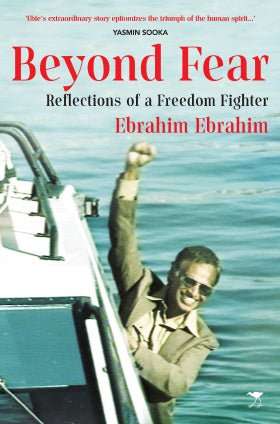
Beyond Fear- Reflection Of A Freedom Fighter
Check my rate
View locations
| Main centres: | 1-3 business days |
| Regional areas: | 3-4 business days |
| Remote areas: | 3-5 business days |

| Main centres: | 1-3 business days |
| Regional areas: | 3-4 business days |
| Remote areas: | 3-5 business days |
Ebrahim Ebrahim was one of the only struggle stalwarts to be sentenced twice to Robben Island. He arrived on the island months before Nelson Mandela in 1964, after being accused number one in the Pietermaritzburg sabotage trial which was dubbed the 'little Rivonia trial'.
He showed exceptional bravery from a young age as one of the founding members of Umkhonto we Sizwe in Natal, and played a key role in directing the sabotage campaign that brought down electricity pylons, disrupted rail transport and shook the apartheid regime to its core.
Over 15 years he played a leadership role on Robben Island as one of the cadres who headed the ANC's disciplinary committee, helping to turn the island into a university of revolutionary ideology.
He was also one of the first five prisoners who enrolled in 1965 to do a university degree with Mandela and Ahmed Kathrada.
After his release in 1979 he operated in the trenches of struggle, providing leadership to the ANC's underground structures in Natal while living under heavily restrictive banning orders. Overnight he disappeared into exile in 1980 on the instructions of Oliver Tambo after an apartheid spy exposed him and he was about to be arrested.
The ANC leadership in Lusaka sent him to a sanitorium in the Crimea for his first ever holiday before deploying him for a six-month express military training course in the MK training camps in the dense bush of Angola.
He was then deployed to Swaziland, the most dangerous of the frontline states for ANC operatives, as the head of the ANC's political military committee. His life was under constant threat as operatives were being assassinated by Eugene de Kock's CCB. He was forced to live in different underground houses every six months until the ANC leadership decided to infiltrate him as the most senior ANC leader into South Africa in 1985, to report on the state of resistance on the ground.
He operated under heavy disguise but once a regime agent identified him as being in the country, one of the most extensive manhunts of the apartheid era ensued. Comrades who had been tasked with hiding him were sadistically tortured as he hid for months in a secret basement to evade capture.
He eventually escaped back to Swaziland only to be abducted in December 1986 from his residence by apartheid intelligence agents and forcibly taken, bound and gagged, back across the border to South Africa where he was tortured in John Vorster Square. The state charged him with treason and were seeking the death sentence. The apartheid judge relied on the fabricated evidence brought by askaris, and sentenced him to a further 20 years on the island saying 'he hadn't learnt his lesson the first time'. Ebrahim won his appeal in a landmark legal judgment where a full bench of judges said the court had previously had no jurisdiction to try him as he had been abducted from a foreign country. He was released in February 1991.
Beyond Fear is a remarkable account of these harrowing ordeals and the inner strength required to overcome them. Ebrahim's story post 1994 was equally enthralling as he traversed the globe doing international conflict resolution and later served as South Africa's deputy minister of Foreign Affairs. His great love story began at the age of 63 to a much younger woman and he ultimately had two children who became his greatest inspiration.